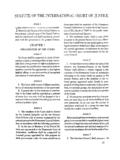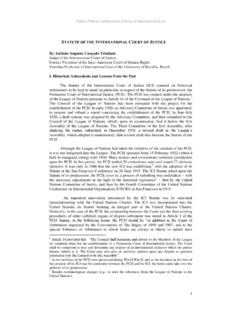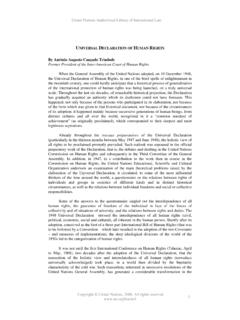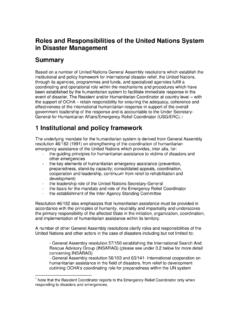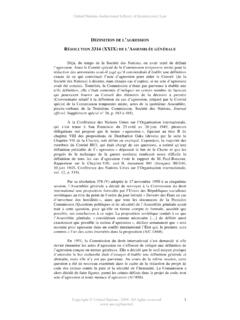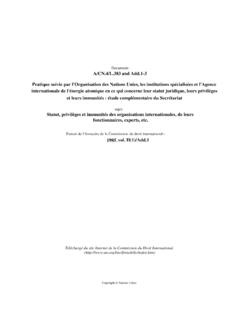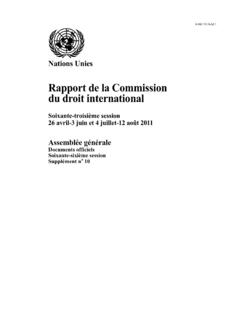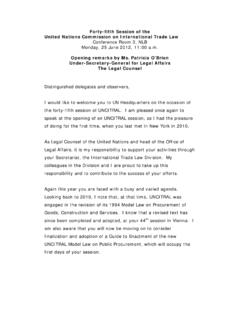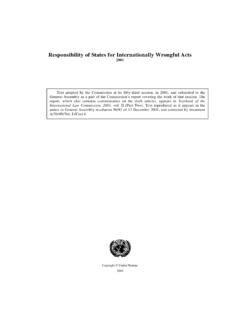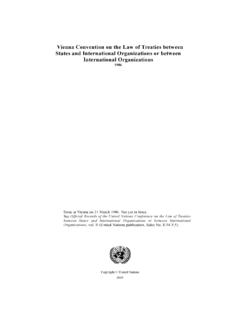Transcription of Guiding Principles applicable to unilateral declarations ...
1 Guiding Principles applicable to unilateral declarations of States capable of creating legal obligations, with commentaries thereto 2006 Text adopted by the International Law Commission at its Fifty-eighth session, in 2006, and submitted to the General Assembly as a part of the Commission s report covering the work of that session (A/61/10). The report, which also contains commentaries on the draft articles, will appear in Yearbook of the International Law Commission, 2006, vol. II, Part Two. Copyright United Nations 2006 369 9.
2 No obligation may result for other States from the unilateral declaration of a State. However, the other State or States concerned may incur obligations in relation to such a unilateral declaration to the extent that they clearly accepted such a declaration; 10. A unilateral declaration that has created legal obligations for the State making the declaration cannot be revoked arbitrarily. In assessing whether a revocation would be arbitrary, consideration should be given to: (i) Any specific terms of the declaration relating to revocation; (ii) The extent to which those to whom the obligations are owed have relied on such obligations; (iii) The extent to which there has been a fundamental change in the circumstances.
3 2. Text of the Guiding Principles with commentaries thereto adopted by the Commission at its fifty-eighth session 177. The text of the Guiding Principles together with commentaries921 thereto adopted by the Commission at its fifty-eighth session is reproduced below. Guiding Principles applicable to unilateral declarations of States capable of creating legal obligations The International Law Commission, Noting that States may find themselves bound by their unilateral behaviour on the international plane, Noting that behaviours capable of legally binding States may take the form of formal declarations or mere informal conduct including, in certain situations, silence, on which other States may reasonably rely.
4 Noting also that the question whether a unilateral behaviour by the State binds it in a given situation depends on the circumstances of the case, Noting also that in practice, it is often difficult to establish whether the legal effects stemming from the unilateral behaviour of a State are the consequence of the intent that it has expressed or depend on the expectations that its conduct has raised among other subjects of international law, 921 These commentaries are explanatory notes reviewing the jurisprudence of the International Court of Justice and pertinent State practice analysed by several members of the Working Group and the Special Rapporteur and summarized in the eighth report of the Special Rapporteur ( ).
5 370 Adopts the following Guiding Principles which relate only to unilateral acts stricto sensu, those taking the form of formal declarations formulated by a State with the intent to produce obligations under international laws. 1. declarations publicly made and manifesting the will to be bound may have the effect of creating legal obligations. When the conditions for this are met, the binding character of such declarations is based on good faith; States concerned may then take them into consideration and rely on them; such States are entitled to require that such obligations be respected. Commentary (1) The wording of Guiding Principle 1, which seeks both to define unilateral acts in the strict sense and to indicate what they are based on, is very directly inspired by the dicta in the Judgments handed down by the International Court of Justice on 20 December 1974 in the Nuclear Tests In the case concerning the Frontier Dispute (Burkina Faso v.)
6 Republic of Mali), the Court was careful to point out that it all depends on the intention of the State in question .923 (2) Most of the cases studied illustrate this principle. Besides the declarations made by France in 1974 on the cessation of nuclear tests in the atmosphere, the public nature of the declaration made by Egypt on 24 April 1957 on the Suez Canal924 and Jordan s waiver of claims to the West Bank territories925 represent an important indication of their authors intention to commit themselves. The Ihlen Declaration, made during a purely bilateral meeting between the Minister for Foreign Affairs of Denmark and the Norwegian ambassador to Copenhagen,926 and the Colombian diplomatic note addressed solely to the Venezuelan authorities are not counter-examples: they relate only to bilateral relations between the two States 922 Nuclear Tests (Australia v.
7 France; New Zealand v. France), Judgments dated 20 December 1974, Reports 1974, pp. 267-8, paras. 43 and 46 and pp. 472-3, paras. 46 and 49. 923 Case concerning the Frontier Dispute (Burkina Faso v. Republic of Mali), Judgment of 22 December 1986, Reports 1986, p. 573, para. 39. 924 Document , paras. 55-58; see also paras. 62 and 63. 925 Ibid., paras. 44-45. 926 Ibid., paras. 116-126; Legal Status of Eastern Greenland, Judgment of 5 April 1933, , Series A/B, No. 53, p. 71. It should, however, be pointed out that whether this declaration constituted a unilateral act is controversial (see , para.
8 122). 927 See Guiding Principle 6 below. 371 2. Any State possesses capacity to undertake legal obligations through unilateral declarations . Commentary Just as (e)very State possesses capacity to conclude treaties ,928 every State can commit itself through acts whereby it unilaterally undertakes legal obligations under the conditions indicated in these Guiding Principles . This capacity has been acknowledged by the International Court of 3. To determine the legal effects of such declarations , it is necessary to take account of their content, of all the factual circumstances in which they were made, and of the reactions to which they gave rise.
9 Commentary (1) The wording of Guiding Principle 3 is also inspired by a passage in the ICJ Judgments in the Nuclear Tests cases;930 allusion is made to this jurisprudence in the Judgments of 22 December 1986 in the Frontier Dispute (Burkina Faso v. Republic of Mali) case931 and of 3 February 2006 in the Armed Activities on the Territory of the Congo In the Military and Paramilitary Activities in and against Nicaragua and Frontier Dispute cases, the Court found nothing in the content of the declarations cited or the circumstances in which they were made from which it [could] be inferred that any legal undertaking was intended to exist.
10 933 (2) Generally speaking, the cases studied by the Commission confirm the relevance of this principle. In the Commission s view, it is particularly important to take account of the context 928 Vienna Convention on the Law of Treaties, 23 May 1969, article 6. 929 See the jurisprudence cited in support of Guiding Principles 1 and 3. 930 Nuclear Tests (Australia v. France; New Zealand v. France), Reports 1974, pp. 269-70, para. 51, and pp. 474-5, para. 53. 931 Case concerning the Frontier Dispute (Burkina Faso v. Republic of Mali), Reports 1986, pp.
